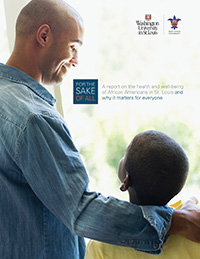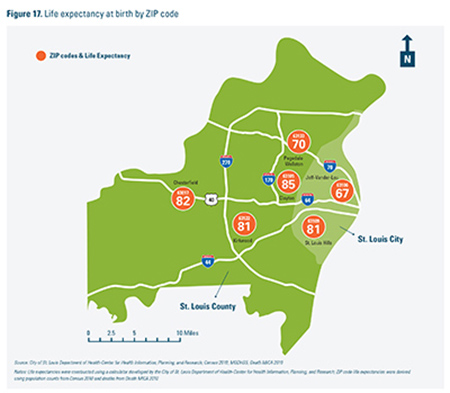A half-century after the Civil Rights Act, unequal access to resources continues to afflict the St. Louis area, resulting in billions of dollars lost in health-care costs and wages.
 But a multidisciplinary, landmark study called “For the Sake of All: A Report on the Health and Well-Being of African Americans in St. Louis,” proposes solutions informed by evidence and community input and includes a call to action to community members and stakeholders.
But a multidisciplinary, landmark study called “For the Sake of All: A Report on the Health and Well-Being of African Americans in St. Louis,” proposes solutions informed by evidence and community input and includes a call to action to community members and stakeholders.
“Many people have an idyllic notion that the civil rights movement happened, Dr. King marched and gave speeches, and now we’re done with the project of the civil rights era,” said Jason Q. Purnell, PhD, assistant professor in the Brown School at Washington University in St. Louis and lead researcher on the project. “That’s simply not true.
“We have a highly segregated community with vastly different access to resources like education, jobs, food and safety, and this has a very real impact on how long people can expect to live, and the quality of life they can expect to have,” Purnell said. “It’s time to confront these realities as a community.”
Purnell and his team, which includes researchers from Washington University and Saint Louis University, released the findings May 30 at a conference at the Missouri History Museum attended by more than 300 regional stakeholders — including elected state and local officials of both parties, other policymakers, community leaders and concerned citizens.
Chanelle Hardy, JD, National Urban League senior vice president for policy and executive director of the National Urban League Policy Institute, served as keynote speaker at the conference, lauding the effort’s “roadmap for progress.”
“A clear strength of this work is that it is not only a report, but a project,” Hardy said. “By including the recommendations that lend themselves to not only policy changes, but changes that can be made by the individual and collective work of teachers, health-care providers, small business owners, community-based organizations and faith organizations, you are empowering St. Louis to make progress right away.”
The final report has many graphics that illuminate the story, including a life expectancy map (below) that starkly illustrates that where people live in the St. Louis region is linked to how long they can expect to live; maps showing how segregation, poverty and deaths due to chronic disease overlap; and a story of the fictional Jasmine, a simplified look at the life of a girl from the perspectives of two different starting points in life.
To read the full report, visit here.

It also includes six recommendations that evolved from more than a year of research, policy briefs and meetings with policymakers and community members. They are:
- Invest in quality early-childhood development for all children.
- Help low- to moderate-income families create economic opportunities.
- Invest in coordinated school-health programs for all students.
- Invest in mental-health awareness, screening, treatment and surveillance.
- Invest in quality neighborhoods for all in St. Louis.
- Coordinate and expand chronic and infectious disease prevention and management.
After today, researchers will continue to engage with area policymakers and community stakeholders.
“We want to look at where the recommendations align with priorities that have already been stated, such as the City of St. Louis Sustainability Plan, St. Louis County’s recently released strategic plan and state-level priorities,” Purnell said.
And take action, he said, that extends into the business sector.
“We’d like to translate this work into some discussion guides and action toolkits for community members,” Purnell said. “We also want to purposefully engage the business community and get their assistance in making the business case for action, helping to formulate new private-public partnerships and other types of corporate philanthropy relevant to the issues we’ve highlighted in our recommendations.”
About the study
The “For the Sake of All” study, funded by the Missouri Foundation for Health, began in March 2013. The idea was to explore the concept of health – not just what happens in a doctor’s office, but a general sense of well-being that helps us engage in daily life.
“It’s an issue that impacts everyone, so we also point to the costs of continuing to let these disparities exist in our community,” Purnell said. “The savings we could realize if we close these gaps between groups include $27 million for mental health-care costs and $65 million for cardiovascular disease, diabetes and cancer care.”
In one year alone, the study reports, the loss of life associated with low levels of education and poverty among African Americans was estimated at $3.3 billion.
“These disparities are costing our community, and using money that could be used to help create jobs and advance the economic vitality of our region, not to mention the vitality of our people,” Purnell said.
Policy briefs were released beginning late last summer and throughout last fall in these five areas:
- “How Can We Save Lives — and Save Money — in St. Louis? Invest in Economic and Educational Opportunity,” written by Purnell and released Aug. 28, 2013, to coincide with the 50th anniversary of the March on Washington;
- “How Does Health Influence School Dropout?” written by William F. Tate, PhD, the Edward Mallinckrodt Distinguished University Professor in Arts & Sciences at WUSTL, released Sept. 25, 2013;
- “How Can We Improve Mental Health in St. Louis? Invest in Our Community and Raise Awareness,” written by Darrell Hudson, PhD, assistant professor at the Brown School, released Oct. 16, 2013;
- “Segregation: Divided Cities Lead to Differences in Health,” written by Melody S. Goodman, PhD, assistant professor of surgery in the Division of Public Health Sciences at Washington University School of Medicine in St. Louis, and Keon L. Gilbert, DrPH, assistant professor of behavioral science and health education in the College for Public Health & Social Justice at Saint Louis University, released Nov. 6, 2013; and
- “Chronic Disease in St. Louis: Progress for Better Health,” written by Bettina F. Drake, PhD, assistant professor of surgery in Public Health Sciences at the Washington University School of Medicine, and Keith Elder, PhD, professor and chair, Department of Health Management & Policy for the College for Public Health & Social Justice at Saint Louis University, released Dec. 5, 2013.
Other partners in the project are WUSTL’s Institute for Public Health, the Brown School’s Policy Forum, The St. Louis American newspaper and the online news site St. Louis Beacon (now part of St. Louis Public Radio).
Purnell is encouraged by the response to the report. “It’s been overwhelming,” he said. “For all of St. Louis’ challenges, there are vast reservoirs of goodwill.”
“People want to see these problems tackled. People from various backgrounds and walks of life want to see these issues addressed.”
For more information about the project, visit forthesakeofall.org.